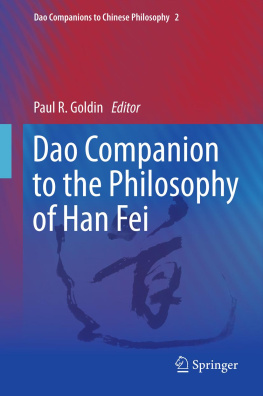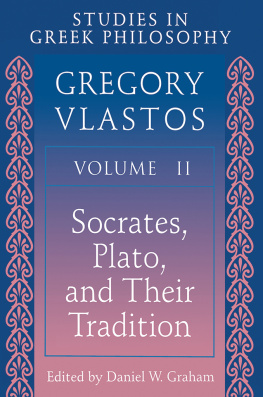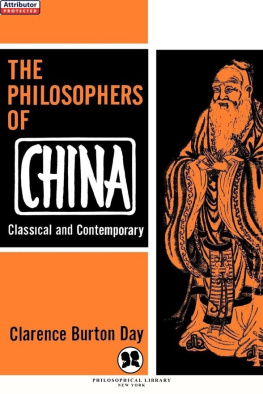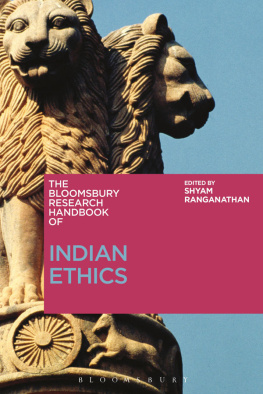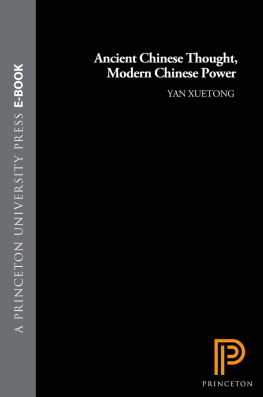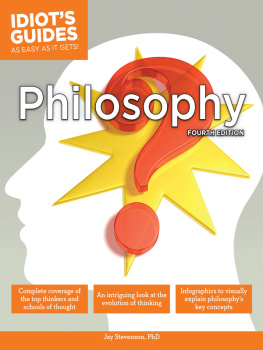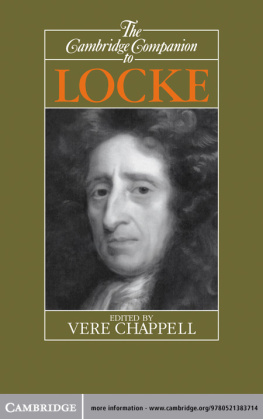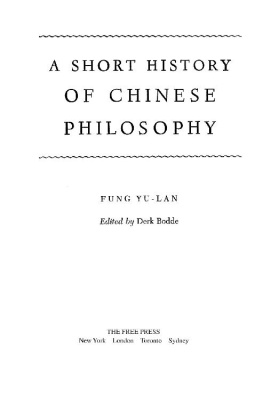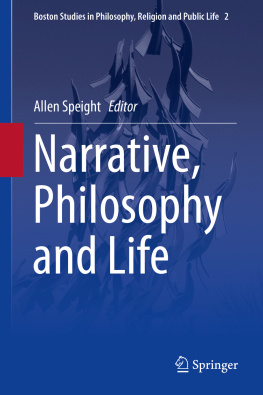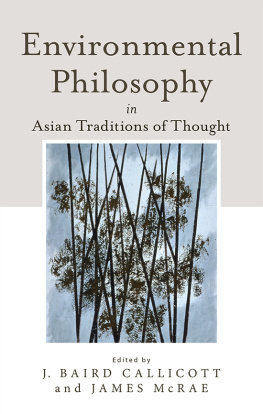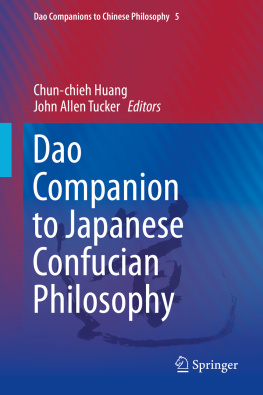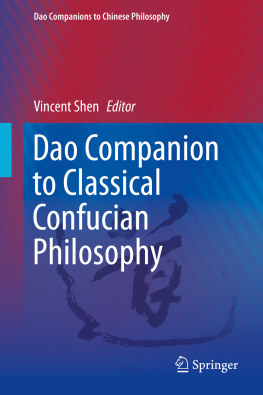Abstract
This introduction to the volume distinguishes between Han Fei, the man, and Han Feizi , the text purporting to contain his writings. While most modern scholars, including the contributors to this collection, accept the bulk of the Han Feizi as genuine, one cannot simply assume that Han Fei was the author of everything in its pages. Moreover, even if Han Fei is responsible for the lions share of the extant Han Feizi , a reader must be careful not to identify the philosophy of Han Fei himself with the philosophy (or philosophies) advanced in the Han Feizi , as though these were necessarily the same thing. What Han Fei said varied with his expected audience, a point that most scholarship on the Han Feizi from the beginnings right down to the present dayhas not taken seriously into account.
The rest of the introduction is devoted to an overview of Han Feis political philosophy and unresolved interpretive problems. One specific conclusion is that Han Feis political recommendations would not have been considered revolutionary in his own day, but his observations on rhetoric and the philosophy of language were truly unprecedented.
Han Fei was the name of a prolific Chinese philosopher who (according to the scanty records available to us) was executed on trumped up charges in 233 B.C.E. Han Feizi , meaning Master Han Fei , is the name of the book purported to contain his writings. In this volume, we distinguish rigorously between Han Fei (the man) and Han Feizi (the book) for two main reasons.
First, the authenticity of the Han Feizi or at least of parts of ithas long been doubted (the best studies remain Lundahl : 1.2.4247); some scholars fear that other material in the text might also be the work of people other than Han Fei.
Second, and no less importantly, even if Han Fei is responsible for the lions share of the extant Han Feizi , a reader must be careful not to identify the philosophy of Han Fei himself with the philosophy (or philosophies) advanced in the Han Feizi , as though these were necessarily the same thing. When we read the works of philosophers, whether Eastern or Western, we generally assume, without too much fuss, that the authors meant what their writings say. Recent trends in hermeneutics have led some critics to assail this as nave (e.g., Keane ), but we still tend to assume that Hobbes endorsed what he wrote in Leviathan , Zhu Xi (11301200) endorsed what he wrote in his Collected Commentaries on the Four Books, by Chapter and Verse ( Sishu zhangju jizhu ), and so on. The case of Han Fei and the Han Feizi is more complex because Han Fei was slippery. What Han Fei said varied with his expected audience, a point that most scholarship on the Han Feizi from the beginnings right down to the present dayhas not taken seriously into account. Most of his chapters are addressed to kings; at least one, The Difficulties of Persuasion (Shuinan ), is addressed to ministers; and for many chapters we can only guess at the intended audience.
As with so many other figures from this period, almost all our information about the life of Han Fei comes from his entry in Records of the Historian ( Shiji ), by Sima Qian (145?-86? B.C.E.). Scholars have rarely questioned the accuracy of this biography ( Sima Qian : 63.214655), and its credibility would seem to be bolstered by the fact that it names several chapter titles found in the received Han Feizi , before quoting The Difficulties of Persuasion in toto . Clearly Sima Qian read at least some part of what we now call the Han Feizi . Fortunately, the details of Han Feis life are not crucial to interpreting the Han Feizi , and the major pieces of information in Sima Qians biography, namely that Han Fei was descended from the ruling house of Hn and that he was executed in 233 B.C.E. after being entrapped by Li Si, are probably not far from the truth. As an adult, he abandoned Hn and sought his fortune as a minister in Qin , the mighty western state that would soon annex Hn before unifying all of China under the famed First Emperor (r. 221-210 B.C.E.). It is in Qin that he must have written the essays that have secured his name for all time, and it is in Qin that he succumbed to the skulduggery of court politics, which he himself described so memorably in his works.
* * *
To understand the attitude of the Han Feizi , and the issues in which the text does and does not take an interest, one might imagine a counselor speaking before a newly crowned king. You are the king! he says. Congratulationseveryone wants to kill you now. Listen to me, and you might survive. All his lovers and sycophants, it turns out, only wish the ruler dead, because they all stand to profit from his demise.
A rulers troubles come from trusting others; if he trusts others, he will be controlled by them. A minister does not have a relationship of flesh and bone with his lord; he cannot avoid serving only because he is bound by [the rulers] power. Thus ministers spy on their lords heart without even a moments respite, while the ruler dwells above them, indolent and haughty. This is why, in our time, lords are bullied and rulers are assassinated. If a ruler puts great trust in his son, treacherous ministers will be able to take advantage of the son and fulfill their private interests. Thus [the minister] Li Dui mentored the King of Zhao [i.e. Huiwen , r. 299-266 B.C.E.] and starved the Rulers Father [i.e. King Wuling , r. 325-299, who had abdicated in favor of his son]. If someone as intimate as ones wife and as close as ones son cannot be trusted, then none among the rest can be trusted either.
Whether one is the ruler of a state of ten thousand chariots or the lord of a state of a thousand, among ones consort, ladies, and the son chosen to be the Crown Prince, there are those who desire the early death of their lord. How do I know this to be so? Between husband and wife, there is not the kindness of a relationship of flesh and bone. If he loves her, she is intimate with him; if he does not love her, she is estranged. There is a saying: If the mother is favored, her son will be embraced. This being the case, the reverse is: if the mother is disliked, her son will be disowned. The lust of a man of fifty has not yet dissipated, whereas the beauty and allure of a woman of thirty have faded. If a woman whose beauty has faded serves a man who still lusts, she will be estranged and disesteemed until her death; her son will be viewed with suspicion and will not succeed to the throne. This is why consorts and ladies hope for their lords death.
But if the mother becomes a dowager and her son becomes the ruler, then all of her commands will be carried out, all of her prohibitions observed. Her sexual pleasure will be no less than with her former lord, and she may arrogate to herself power over the ten thousand chariots: 5.17.32122)
Although Han Fei emphasized that none of the rulers associates can be trusted, most of what appears in the Han Feizi deals with the rulers relations with his ministers. Evidently, they were regarded as the party most likely, in practice, to cause him harm, because they were indispensable: by Han Feis time, states were already so large and complex that a ruler could not hope to oversee the administration personally ( Chen Qiyou : 2.6.107). But relying on ministers is dangerous, because they act in their own interest, not that of their employer and certainly not that of the kingdom they represent.

